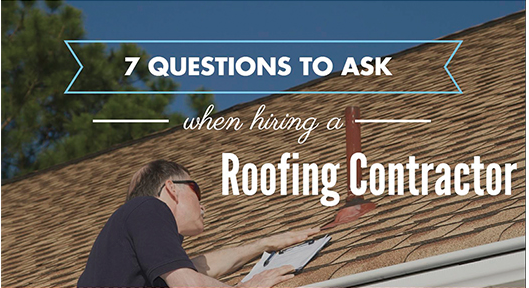Having your home severely damaged by a storm can turn your world upside down. The damage could simply be cosmetic, or so extensive as to render your home uninhabitable. In either case, you need to act fast, but smart, to ensure that your home will be properly repaired.
Often, foremost among your concerns will be your roof, as it is protects the rest of your home and possessions. Start your post-storm repair process with these tips from the experts at CertainTeed Roofing.
- Keep safety first. Leave emergency repairs to the professionals. A crisis that affects your home is an emotional event, but your safety is paramount. Do not attempt any emergency repairs unless you are qualified to do so.
- Prepare for your insurance adjuster. Take time to do your own documentation. Take plenty of photos and notes on the damage to your home. This information will become a helpful checklist to compare against the insurance company’s findings. When it comes to the roof, check outside for things such as blown off shingles, damaged gutters and large branches that may have fallen onto your home. Also, if you can safely access your attic, examine the underside of your roof for damage or leaks.
- Find the right contractor. You will want to interview at least three contractors for your roof repair. This allows you to compare prices, work styles and other factors before making your selection. Here are some key questions to ask:
- Are you a credentialed installer? Most shingle manufactures have strict guidelines for installation. These assure that you get the best performance and meet the requirements for the product and/or workmanship warranty. For example, CertainTeed Roofing issues education-based credentials such as the ShingleMaster or SELECT ShingleMaster.
- Do you have storm experience? Some contractors are experienced in storm restoration and trained in storm damage evaluation and repair. These are the contractors you want when dealing with an insurance claim.
- Where is your business located? You will want a local contractor with an established business location who can provide at least four to five references. This way, if you need to follow up for any reason, they will be easy to reach.
- Do you carry liability and worker’s comp insurance? Your contractor should be fully insured with liability and workers compensation insurance. This will protect you should any workers get hurt during the repair process.
- Are you licensed with the state or municipality? The answer to this question may be no, as not all states or municipalities have licensing requirements for roofing contractors. If licensing is required, there are websites, such as the Illinois Department of Financial and Professional Regulation, where you can look up a company’s status.
- Check for special repair designations required by your insurance. In some instances, insurance companies require that certain materials be used in the repair of your home. In areas prone to hail storms, for example, you may be required to install shingles that are classified as impact resistant, which stand up better to hailstorms.
Find more tips to help guide your roof repair, and find qualified installers in your area, at CertainTeed.com. SOURCE: CertainTeed (Family Features)


